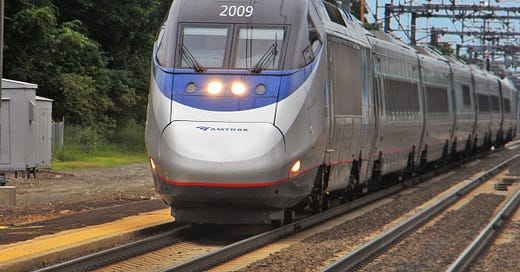✂️ Know what you don't care about and make the most of it
On deciding what you're optimizing for, not doing it all, and cutting away
I often take Amtrak trains up and down the East Coast, and these days the trains are moderately crowded, so I have some choice of where to sit, but not total free rein. Generally, about two-thirds of the rows are next to a window, where you can see the cities and towns, rivers and bridges roll by. But these seats are popular, so you’ll usually have to sit next to someone. Meanwhile, in the remaining one-third of rows, you're stuck next to a rather boring slab of plasticky wall — but since few people want to sit there, you'll likely get two seats all to yourself. Tradeoffs, tradeoffs.
Fortunately, the decision is an easy one for me: I've seen the “scenic” suburbs of New Jersey and the actually-scenic coastline of Connecticut umpteen times, so I don't really care about getting a window seat. So the choice is clear: sidle up to the plasticky wall, and get two full seats all to myself. Living like a king, albeit a king with a bad view.
In other words, if you know what you don’t care about, you can lean into that, and take up an advantageous niche that nobody else wants to occupy.
What matters to you and what doesn’t
I'm realizing that I've been subconsciously using this strategy for a while now. Back in college, I knew I didn't really care about getting English honors on my degree or writing a thesis, both of which would have required extra (and more intense) comp-sci classes. So I leaned into that and spent my time instead taking fun and varied classes, nearly picking up 4 minors in the process1, and I got to throw myself into all kinds of fun clubs. Obviously, graduation day was a bit disappointing, but I was satisfied with my choices overall.
Similarly, back when I worked in Big Tech, I quickly realized that I was a bit weird in that I didn’t prioritize getting on the fast-track for promotion. And because I knew that, I was able to spend my time doing interesting things that most people would not have: writing internal newsletters, taking on “20% projects,” doing pro-bono work, etc etc.
I guess the idea of “optimize for what you care about, and ignore what you don’t” sounds obvious in retrospect, but it was a big revelation for me, since my whole life I've had a bad habit of trying to be all things to all people — trying to do everything, and do everything well. The very notion of saying no to something, of consciously slamming the door on an opportunity, was foreign to me.
It seems like I slowly realized that the “do it all” mindset would eventually leave me stretched out too thin, stuck at the 60th or 70th percentile (at best) of everything, never truly reaching the pinnacle of what mattered to me. Perfection on all counts — like getting a window seat to yourself on the Amtrak — is probably infeasible, so don’t hold it up as an ideal to strive for.
To cut away
As I took my seat on the train the other day, with as bad a view as ever, I started thinking about the word “decide.” It combines the Latin root “de” (meaning “away,” like in “detach”) with “cision” (meaning “cut,” like in “incision”). Taken literally, the word “decide” means “to cut away.” Life is full of decisions, which means you have to regularly cut off paths that you don't care about going down, even if everyone else wants to walk down them. In life, school, career, and (I suppose) in business, if you can quickly and cheerfully chop off the things you don’t care about, you can do really well at what you do care about. ◻️
Of course, I missed out on every single one of them by one or two classes.




